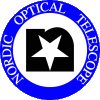
Health and Safety Issues for Visiting ObserversProvided here is some general health and safety advice for vistors to the Nordic Optical Telescope.Health AdviceWorking at the TelescopeThe Observatorio del Roque de los Muchachos (ORM) is situated at an altitude of 2400 metres. This does not usually represent a major problem, and no medical examination is required for visiting observers.Note however that at this altitude the atmospheric pressure is approximately three quarters of sea-level pressure, similar to a pressurised aircraft cabin. This does have physiological effects:
Note that the effects of heavy colds, head and chest infections and sinus conditions are greatly exacerbated on the mountain. If for any reason you think that working at altitude might affect your physical condition, it would be advisable to check with your local doctor before coming out. If you a have a medical condition which may be significant in the event of an accident or emergency (e.g. repiratory or heart problems, epilepsy, diabetes), please inform the member of staff at the telescope. Finally, all observers should rent a car for the duration of their stay on La Palma and be able and prepared to drive it at all times. In case of sudden onset of bad weather (e.g. snow storms in winter), the telescope site can be cut off for several days without electricity, heating, and food, and it is dangerous and forbidden to go to the Residencia by foot. The roads to and from ORM as wells as to and from NOT within the observatory are steep mountain roads; observers who are unfamiliar with such roads should consider to take a refresher course before they arrive. First aid facilitiesThere is a first aid room in the Residencia. At the telescope there are first-aid kits in the control room and the service building.Some items which visitors are advised to bring include lip-salve (the atmosphere at the ORM can be extremely dry) and sun shield, though both these items can usually be purchased from the Residencia receptionist. Also travel-sickness tablets (for those who might be affected by the journey up the mountain road). Medical EmergenciesIn case of an emergency contact a member of staff who will then take appropreate action. If a staff member can not be found and it is believed an ambulance is required then the emergency number is (0)112, you should be answered by someone who can speak English. Alternatively you can phone the Residencia night porter on extension 2500 or 609 554 576, who will be able to advise you.If you are feeling ill, for your own safety, do not under any circumstances go to your room and lie down without first telling someone.
If someone else tells you they feel unwell, make sure a member of
staff is informed.
Observers Safety at the NOTGiven here is some basic safety advice for visiting observers to the NOT:
In addition to the above the Residencia ORM administration also supply
some safety information which you would normally receive as part of a
room booking confirmation and is repeated here |
||
|